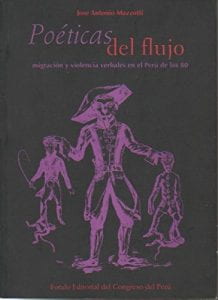A Review of Poéticas del flujo: Migración y violencia verbales en el Perú de los 80
Peruvian Poetry

Poéticas del flujo: Migración y violencia verbales en el Perú de los 80. By José Antonio Mazzotti Fondo Editorial del Congreso del Perú, Lima, 2002, 234 pages
José Antonio Mazzotti, in his second book, Poéticas del flujo. Migración y violencia verbales, identifies the different trends in 1980s Peruvian poetry. With characteristic flexibility and a wide-ranging scope, Mazzotti offers the reader a fresh critical analysis of this period of literature. He also gives us innovative ways of looking at literature, culture and the national imaginary in Perú. His analysis can be taken as a reference point for future reflection on Peruvian literary production.
Mazzotti, an associate professor of Spanish in Harvard University’s Department of Romance Languages and Literatures, recognizes the continuous intersections between art and society in which art fulfills the role of transcribing and portraying in movement what is happening within society. At times, Mazzotti points out, art can also set the agenda and ignite the spark that actually puts into motion societal change. Through literary interpretation, the author recognizes new spaces of political representation that emerged in the 1980s, particularly in the realm of poetry. Each chapter takes a close look at these new spaces.
The study opens with an examination of Quechua poetry developed during that period. This phenomenon is closely related to the mass migration from the countryside to Lima, the so-called “Andeanziation” of Perú’s capital city. The Quechua poets are migrants themselves, and Mazzotti gives eloquent testimony to their fractured—although not tragic—existence. He portrays them as divided in an unresolvable ambivalence between the secularization of the modern city and the traditional mythic thought of the Andean world.
The second chapter of Poéticas del flujo focuses on poetry by women. This type of poetry reflects the attempt to achieve a genuine position within the patriarchal society through the transgression of the limits imposed on feminine sexuality. Mazzotti demonstrates great astuteness in perceiving this phenomenon as a growing trend in which the voice of the rebellious woman—still sullied by “phalocentric” and “machista” canons—is demanding to be recognized in terms of absolute parity, that is, as an authentic political entity.
The third chapter takes a close look at Perú’s insertion into the world of market capitalism and mass culture. Listening to the words of urban poets with a fine stethoscope, Mazzotti demonstrates that the forms and schemes once considered foreign impositions or “alienating” have become an integral part of Peruvian culture without denigrating it. Indeed, these foreign influences have enriched the culture and have affirmed its many-sided nature. There is an implicit faith in the potential of Peruvian culture to readapt and take advantage of outside influences.
In contrast, the last chapter recognizes the trauma of modernity in Perú, as well as the conflictive road map created by hitherto unknown economic and social processes on a worldwide scale. The figures of the unemployed Peruvian, those trapped in the informal economy, and the drug addicts, emerge here painted in all their desolation, their fury, and their political nihilism. To them, Mazzotti dedicates his perceptive and critical gaze.
Fall 2003, Volume III, Number 1
Rafael Espinosa is a Peruvian poet and a member of the Working Group on Culture in the Peruvian Congress. A version of this book review was previously published in the press release notes accompanying the launching of the volume in Lima.
Related Articles
A Review of Historieta Doble: A Graphic History of Participatory Action Research
In 1997, I attended the worldwide Action Research Conference in Cartagena, Colombia. One of the sessions opened a space for action research from industrial settings. I presented a project on learning in a network of small businesses in a region of Norway. A Mexican professor raised his hand after the presentation and said: “Excuse me for being direct, but do we live in the same world?”
A Review of Liberation Theology and Praxis in Contemporary Latin America. As it Was in the Beginning?
The book Liberation Theology and Praxis in Contemporary Latin America assumes great relevance with the shifting landscape of the Catholic Church under Pope Francis, whose papacy has signaled a renewed engagement with many of the themes central to liberation theology. From his emphasis on economic justice and ecological responsibility in Laudato Si’ to his advocacy for oppressed communities, Francis has revived aspects of liberationist discourse that were marginalized under previous pontificates.
A Review of The Return of the Contemporary: The Latin American Novel in the End Times
Latin America, and the world more broadly, has been mired in crisis throughout the first quarter of the 21st century. From economic downturns to ecological disasters to legacies of racism and enslavement, the neoliberal trends of past decades have permeated our daily lives with instability amid longstanding narratives of constant progress. If, as we are told, our society is constantly progressing, why has precarity abounded? In The Return of the Contemporary: The Latin American Novel in the End Times, Nicolás Campisi explores the ways in which contemporary Latin American authors confront these realities, focusing on the genre of the novel.




